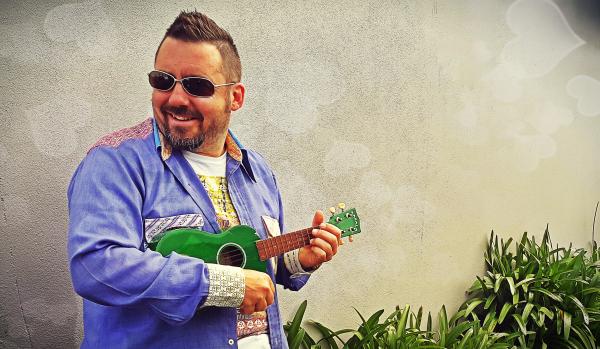Gareth
Changing the world one word at a time
Gareth Edwards is mad. That’s the term he uses to describe himself in his songs – and he knows more than a thing or two about the experience.
Manchester born and bred, and now living near Raglan in the Waikato, Gareth lived through “some highs and lows” during his mid-20s, which led to homelessness, hospitalisation and a diagnosis of bipolar disorder.
“During my time in hospital I had to accept ideas that didn’t really resonate with me – that I had a ‘mental health problem’, was suffering a ‘mental illness’, that I had ‘a mental disorder’,” he says.
“Looking back, I realise that my healing has a lot to do with unlearning those ideas.”
After leaving hospital, Gareth worked within the mental health system. He admits to having about 10 jobs in five years, “always looking for ways to make it [the system] better”.
Solace and hope in music
Gareth found solace and hope in his music. For a long time, writing songs allowed him to express how he felt about madness and the way it is viewed by society.
“Through my songs, I have found ways to express both the ‘inside’ experience of being mad and ‘outside’ experience of how society responds to that,” he says.
“I like to play with language – because it frames how we see ourselves – and I’ll often use humour in my songs as a way to shine light on a normally dark subject.”
Changing the world one word at a time
Eventually Gareth decided the only way he could effect change was to step outside the system.
“I established a company called Positive Thinking as a platform of independence and a vehicle for creating alternative systems,” he explains.
“Over the last eight years I’ve been involved in designing peer support services like Warmline and online self-help services like the ‘The Journal’, fronted by Sir John Kirwan.”
Positive Thinking also carries out research and evaluation projects, such as improving human rights for those with lived experience, new ways to address homelessness and media reporting of suicide.
Asset and a weakness
Having worked within and outside traditional mental health services, Gareth believes having mad people in the mental health workforce is our greatest asset and biggest weakness.
“We have a growing presence in the mental health system through ‘lived experience’ roles and this has the potential to transform the way services and society responds to madness,” he says.
“However, we are fragmented and dispersed and this undermines that transformational potential. Efforts to address this get limited to the places we work or the job we have, rather than seeing the national or even international professional network that could unite us.”
Never one to sit still and let an opportunity to change the world pass by, this year Gareth has added to his long list of achievements by founding Mad To Work Here, a movement people are welcome to join regardless of where they work or what work they do.
“It’s about bringing people together to talk about working with a personal and professional perspective [of madness],” he says.
“It’s also a place where we can celebrate who we are… which usually means a song or two!”

